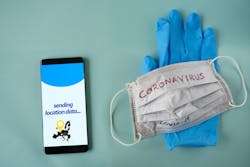In response to the COVID-19 pandemic, Google and Apple have announced a joint effort around contact tracing that will leverage Bluetooth technology to help governments and health agencies reduce the spread of the virus.
As company officials noted in a joint press release announcement on April 10, since COVID-19 can be transmitted through close proximity to affected individuals, public health officials have identified contact tracing as a valuable tool to help contain its spread.
Contact tracing—identifying individuals who may have come into contact with an infected person and then collecting data on these contacts—has helped stop previous deadly outbreaks, but the current COVID-19 virus presents a far greater challenge given the number of cases in the U.S. already. For the coronavirus, the method has proven beneficial in Singapore and South Korea in slowing the viral spread.
A number of public health authorities, universities, and non-government organizations (NGOs) around the world have been working to develop opt-in contact tracing technology, they noted.
To further this cause, Apple and Google say they will be “launching a comprehensive solution that includes application programming interfaces (APIs) and operating system-level technology to assist in enabling contact tracing. Given the urgent need, the plan is to implement this solution in two steps while maintaining strong protections around user privacy,” officials stated.
The first step is having both companies in May release APIs that enable interoperability between Android and iOS devices using apps from public health authorities. These official apps will be available for users to download via their respective app stores.
Second, in the months to follow, Apple and Google will collaborate to enable a broader Bluetooth-based contact tracing platform by building this functionality into the underlying platforms, officials said. “This is a more robust solution than an API and would allow more individuals to participate, if they choose to opt-in, as well as enable interaction with a broader ecosystem of apps and government health authorities.”
In a previous interview with Healthcare Innovation, John Halamka, M.D., president of Mayo Clinic Platform, touted contact tracing as a way for folks, with consent, to contribute their data to a national resource. “This is de-identified; you don’t care who I am. Similar to how Waze helps us figure out traffic patterns because there are multiple people contributing their driving paths, people will contribute their walking paths, and when they test positive, they contribute the fact that this was a positive path as of a given date and time. You could then have a sense of if you encountered a safe place or an unsafe place on your path,” Halamka said.
Leaders at Google and Apple emphasized that privacy, security, transparency, and consent “are of utmost importance in this effort,” and are central to its design. The companies said they will openly publish information about the work for others to analyze.
Together, Google and Apple released draft technical documentation including Bluetooth and cryptography specifications and framework documentation.


